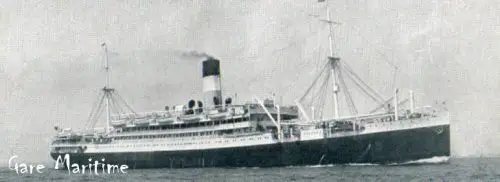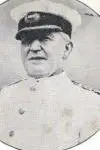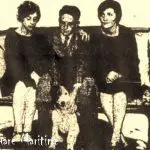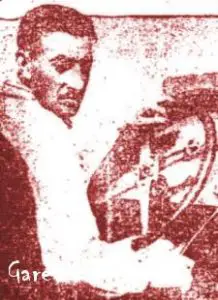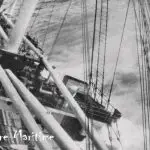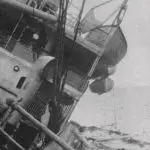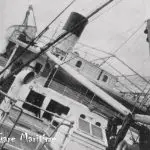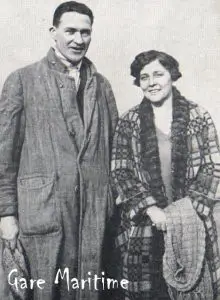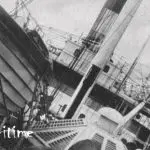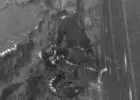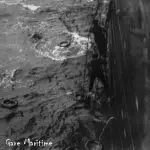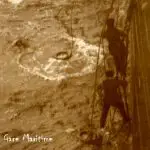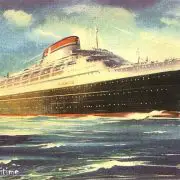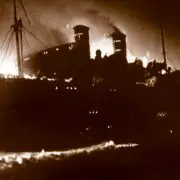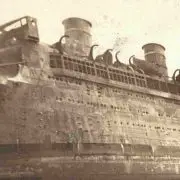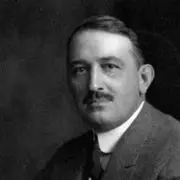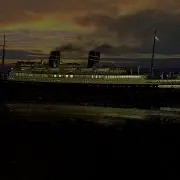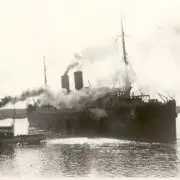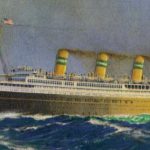My God the boat is leaving us!
Lamport and Holt Line’s Vestris sailed from Hoboken, New Jersey, on the afternoon of Saturday, November 10, 1928, bound for Barbados and South American ports. She carried 129 passengers in three classes, and a crew of 199. Sunday morning, in rough weather, it was discovered that the Vestris was taking on water and, by nightfall, four separate leaks had induced a dangerous list. An SOS was not sent until 10 a.m. the next day, and at two that afternoon she sank, two hours after the order to man the lifeboats had been given. The first rescue vessels arrived on the morning of Tuesday the 13th and, ultimately, sixty passengers and 154 members of the crew survived. Nearly half of those lost were victims of an act of surprising cowardice: the abandoning of foundering Lifeboat #8 with perhaps 65 persons aboard it, by Lifeboat #1 which carried, perhaps, ten.
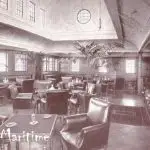

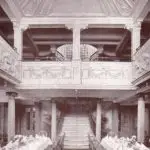
Smoke Room, Lounge and Dining Room
Captain Fredrik Sorensen, 39, a veteran of 20 years at sea, boarded the Vestris bound for Barbados and warm water in which to swim~ he had recently had an operation to remove varicose veins from his leg, and felt that a vacation spent swimming would be therapeutic. His was to be the longest account given by any of the few survivors from Lifeboat #8: Sorensen had a fine eye for detail and a good memory, and his angry account jibes well with those of the others.
Fredrik Sorensen The Vestris pulled out from Pier 14, Hoboken at 3:00 P.M. Saturday afternoon, September 10th. On Sunday it started to blow and by Sunday evening it was blowing a whole gale and the sea and wind were on the port beam.
We sailors have various terms to describe various wind and weather conditions. The first is a hurricane, the second is a storm and the third is what we call a whole gale. In a whole gale the wind is blowing about sixty miles an hour and the sea is rough. It was this sort if thing which struck us Sunday. The Vestris was rolling heavily and had a slight list. The rolling made it worse.
Sunday night we all had to eat in the first class salon because the fire in the second galley was out. Some of the rooms were swamped. There was not many in the dining room. The ship was rolling heavily and nearly everybody was sick. Some of the waiters got hurt in going around and one got his finger cut off. I had a good appetite. I was hungry but finally I had to give up and just asked for a piece of meat and some vegetables on one plate.
Just then the Vestris took one heavy roll and everything went to the corner – tables, chairs, china and food. I think some of the passengers got hurt and some of them gave up then. There were some women in the dining salon. They got out when that happened. A few of them started to cry but no one screamed or carried on much.
I stayed up most of the night going around with some of the passengers who wanted to talk to me for company but I finally did go down and get a little sleep. In the morning she had a heavy list – so bad that when I got up I tumbled over. I judge that list to have been pretty nearly forty degrees.
I went up on deck. I knew that the engines had stopped but members of the crew kept telling the passengers that the ship was still moving – kidding them along. One man, a first class steward who had his hand hurt, went around passing out biscuits and cheering up the passengers. As far as the captain and the officers went, I never saw them at this time which was between seven and eight o’clock. They were jettisoning cargo from No. 3 hatch by hand. I don’t know how much cargo they discharged and this kept up until about ten o’clock.
They were taking the bales and boxes up by hand, and throwing it down the sliding deck. The stuff looked like heavy stuff or hardware to me.
About ten o’clock the passengers were all gathered together. The third class passengers came up with life preservers on. The stewards began going around among the passengers saying that there was no danger and to keep calm. Some of the women in the first class began to get a bit worried then.
Most of the women were on the boat deck at this time and most of the kids. There was one women there – I don’t remember her name – she was between thirty and thirty five. She had two children in her arms, one a boy about one or two years old and a young boy probably about four years old. The children were whimpering a bit and she was kissing and petting them as a woman will. I guess the little ones were hungry. They hadn’t had anything to eat you see.
Then there was an elderly lady and a young woman to whom I had talked a little bit, both going down to Barbados and two or three young couples. One woman, Mrs. Clytie K. Raphael, of No. 302 West 111th Street, New York City, and her mother down there and was going to visit her.
Some of the women asked me to get them some life preservers and so I went down and started to get them out of the state rooms. One of the stewards gave me hell, saying, “What are you trying to do, frighten them?” I said it was just a matter of precaution but he told me I couldn’t take any life preservers out of the rooms. So I went down to my room and got out the four life preservers that were there and passed them around as far as they would go.
Some of the women were crying softly or to be more correct one would say they had tears in their eyes. The kids were very quiet, too, but everyone was anxious and nervous and everyone sort of felt that the boat was going to go. Just then they started to bring out a colored woman. She appeared to have gone a bit crazy. She was singing some sort of a hymn all about going down in the water. She had a colored man with her and she was passing her hands all over his face and he was telling her to cut it out and trying to keep her quiet. But she just went on singing that hymn until finally they got her quieted down.
It was a queer thing that hymn sounding through the boat in a queer sort of wail at that time – sort of got on a fellow’s nerves. This was the time before I went on deck for the last time, having made several trips to get life preservers, clothes and so on for some of the passengers.Just as I got on deck I heard the order “Women and children in the boats.” The old lady who was standing on deck sort of shivering – the one I spoke about before – spoke up. “Do they really mean it?” she said. I told her they did and then I went over to the boats to give a hand.I put the woman with the two little boys in the boat and then I handed her the two children. I got another man to stand by and we passed the women along and helped them over the rail and into the boat.
They were having trouble lowering the boats and this one was only half way down the side. There were only a few men of the crew in the boat, just enough to let go the falls. I saw that boat lowered. It hit the sea all right but they had trouble letting it go. Instead of using the releasing gear the men in the boat began to cut away the boat falls with hatchets. This took some time.
Another boat was put over the weather side with women and children in it. This boat was never launched. It was stuck on account of the ship having such a bad list and I suppose it went down with the ship.
I stayed on the port side because I didn’t want to get in a boat. I was going to stay on the ship. I thought I’d have a better chance with my life preserver on and then jumping in when the ship went down.
There were a couple of boats aft which somebody cut adrift but here in midship there were three boats left. The Number Eight Boat had a hole stove in her and they patched it up with a piece of tin and a few nails and I thought to myself if I go in a boat I’ll keep clear of that one.
As I was standing at the rail I saw Paul A. Dana, South American representative of the Radio Corporation of America whom I had come to know while on the ship. Dana called to me to come along in the boat, saying “Come on, we need you, Skipper.” So I walked down the hull, holding on to a rope as I did so and got in.
In the boat were Major Yashio Inouye and his wife, two Japanese. They were sitting together very quietly.
I also saw Mrs. Raphael, with whom I had become acquainted while on the ship.
Mrs. Clara Ball, a stewardess was also on this boat and there seemed to be several children aboard too. I know there were at least on or two because I heard them crying or whimpering as they huddled down in the bottom of the boat.
Captain Carey The last thing I saw as we pulled away from the boat was Captain Carey who was standing at the forward end of the boat deck giving orders about lowering a boat. I heard him say “only lower one boat at a time or you’ll have one on top of the other.” The second officer was also there giving orders. They both looked worn out but calm. I felt sorry for Captain Carey at the time and I still feel sorry for him. I knew what he was up against. He had made an error of judgment and if he had lived he would have been tried for negligence. He took the only way out and somehow seeing him standing there as we pulled away I thought he would take this way out. I noticed that he had on no life preserver and that his face was set in a way which comes when a man sees his end.
The kids in the bottom of our boat began to whimper. We had only gone a short distance when I saw the ship sink and saw the heads of a lot of people in the water. We couldn’t make out whether they were men or women. We could just see their heads in the water and see them splashing about.
Nobody screamed or said anything much except on woman who was sitting near me. I think she was Mrs. Raphael. She just sighed and said, “Look, she’s gone.”
From then on the men in the boat kept busy bailing, or rowing. There were no officers in board so I took command of Number Eight Boat.Pretty soon we came across a boat with only four members of the crew in it. I think it was Number Nine Boat. Somebody in our boat hailed them and asked them to take some of the people out of our boat which was shipping water pretty rapidly.
I knew we would stay afloat awhile and so I hollered “Never mind, but go and pick up some of those people in the water.” I do not know whether Number Nine Boat did so or not.
A few moments later we came across another boat. There were some petty officers in it. Their boat was half foundered and they were floating on their air tanks. We couldn’t do anything to save them – we had too many in our boat, probably sixty persons or so.
Under the weight of all these people Number Eight Boat began to ship more water. There began to be some excitement on board. The men shouted “Bail” and began to bail with everything they had. I asked them to keep calm. At that time I hoped that Number Eight Boat would stay afloat on her air tanks. But the water gained on us so rapidly that I soon knew she was going to be swamped but I didn’t want to frighten those in the craft by telling them so.
When we saw the water gaining like that we started to make for some of the other boats. But a soon as we reached any other boat it would pull away from us and we had a hard time to get down to them. Finally we got to Number One Boat. When we reached Number One Boat our own boat was nearly filled. The women in our boat were standing in water. They called out: “Please come and save us.”
There were only eight men in Number One Boat. The women in our boat were standing up in the water. One of them I think was holding up her child. They called out “Please come and save us!” Number One Boat just stayed there and the people in it just watched us, all except the woman, Mrs. Devore. I saw her moving her arms and I guess she was talking to the men in that boat.
Just then Number Eight Boat became filled with water and swamped. Just as the sides went beneath the water and the water came up on us I heard Mrs. Raphael say: “My God the boat is leaving us.”
When Number One Boat saw that we were being swamped it pulled away. This is something I can never forget and it makes me feel pretty bitter against that crew. There were only eight men in that Number One Boat and Mrs. Devore. They had a capacity for sixty people and they could at least have taken of all the women and the children from Number Eight Boat and have let the rest of us hang on to their life lines.
Mr. Devore was on our boat. His wife heard his voice calling across the water and as I learned afterwards she begged and pleaded with the cowards on Number One Boat to come to our rescue. Instead of doing so they pulled away and left the people on Number Eight Boat to drown. I will never forget my feelings as I saw Number One Boat pull away. I was wishing for a gun and gosh if I had had one I would have used it. If one of those cowards in Number One Boat had been shot the others would have come along.
As I watched Number One Boat pull away and was holding on the thwart of our boat a big wave came aboard us and it washed me away. There was nothing more that I could do and I was glad to be away as I did not want to stay and see all those people drown.
After I swam away I looked back and I could see Number Eight Boat swamped and down in the water with the people in it all huddled together and the water all around them. It looked like a little island of people in the sea.
When I saw that sight I thought I might as well go on swimming and take a chance in the open sea. There was one fellow and a woman swimming with me. Mrs. Ball and Herman Ruckert.
There was a boat some distance away, about a quarter of a mile. I guess. All the boats had been pretty well scattered by this time. We were all swimming for this boat, the three of us but when we got close to it the boat turned around and pulled away. I felt pretty bad about that. It looked as if those on that boat intended to save their own skins no matter what happened to any one else and that’s not the rule of the sea.
Mr. Ruckert was close to me at this time – right behind me and when he saw them pull away he said “I’ve got to give up.” I said “Don’t give up. I see a sail. I am going to swim as fast as I can and see if I can head him off.”
I swam to the sail boat and this boat, Number 14 hauled down his sail and I was pulled aboard. This boat was commanded by the colored Quartermaster Lionel Lichorice. He went after Ruckert and picked him up. We could see nothing of Mrs. Ball. Later I learned that she swam back to Boat Number Eight and after it broke up had spent the rest of the night swimming around with Mr. Dana.
We tried to get to Boat Number Eight under sail but she was to windward of us and we could not beat up to her. It was getting dark but every time our boat was on top of a wave it seemed to me I could still see that little group of people in swamped Number Eight Boat standing in the water and waiting to be picked up – a sort of human island in the sea.
There was no trace of Boat Number Eight when morning came and we were picked up by the American Shipper.
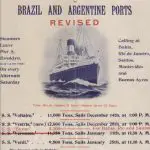
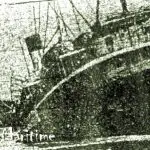
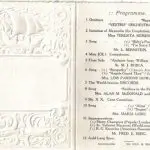
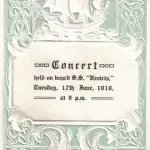
1912 Poster for the Vestris; and earlier accident; a programme from 1912
Earl Devore, second place finisher of the 1927 Indianapolis 500, was traveling to series of races in Argentina, with his wife, Ann, his $10,000.00 race car, and his dog, Speedway Lady. Mrs. Devore and the dog returned to New York aboard the American Shipper, and from there added a second account of abandonment at sea. Although Captain Sorensen believed that Mrs. Devore was a passenger in Boat #1, the couple boarded the same boat together and were separated when the crew in #1 agreed to let a few passengers transfer to their boat:
Ann Devore Saturday the weather was fine. Sunday it was rough. There was a swaying and listing of the ship. On Monday morning my husband examined the register in the room and said: “I have never been on a ship where there has been such a list. It looks to me like serious trouble.” Norman Batten came by and said “Don’t take time to shave.”
We dressed quickly, went on deck. The slope was dreadful. The ship was below water on the starboard side as far as the upper deck. We had to hold onto the railings to prevent ourselves from slipping overboard. With difficulty we found an officer. He assured us everything was alright. By noon everything would be ‘fine and dandy’ and we would be under way. The ship’s officers went around and explained that everything was alright. Then came the order to take to the lifeboats.
I was in lifeboat #8 with Mr. and Mrs. Batten of Los Angeles. Norman is an automobile racer. He was going to South America to do some racing. This boat had a hole in it and five minutes before it was lowered this hole was patched with a piece of tin and some nails. Several of us called to the Captain and asked “isn’t it dangerous to send people out in a boat of this shape?” and he turned around and walked away and said nothing.
Earl Devore We had nothing else to do but take the boat. We got into it. As soon as it got into the water it began leaking. We were overcrowded. The boat shipped water. She was filling fast by now. Boat #1, with four negro seamen in it came by. We called to them to give us aid and take some of us out so that all might be saved.
They drew near, and my husband urged me to jump. I did so. Then they pulled away from #8. A sea came between us. When I saw #8 again, it was capsized and everyone was in the water. I begged the men to go back and pick up my husband and my friends, but they would not. They told me to be quiet and sit down.
Ann Devore was living in Los Angeles and supporting herself by working for a funeral director in the late 1930s. She was still bitter about the crew, and about the amount of hate mail she received as ‘the woman who saved her dog and abandoned her husband.’ Her final known statement on the matter: “What was I supposed to have done, held her head under water until she drowned?” Speedway Lady survived until 1933, when Ann Devore lent her to a friend to take on a hunting trip, on which she was lost in an accidental shooting.
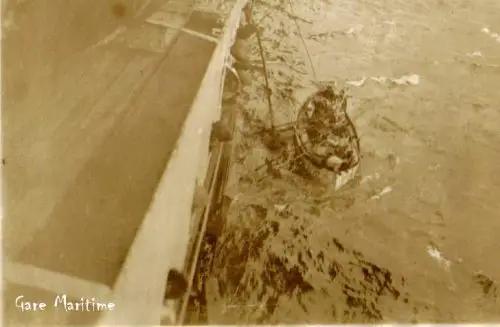
A lifeboat approaches the Berlin
Marion Batten, of Dayton, Ohio, and Los Angeles returned aboard the U.S.S. Wyoming. She reported that as she and her husband and Mr. Devore attempted to follow Ann, the crew of Boat #1, they were pushed back by oars wielded by the crewmen. During the course of the afternoon and evening, #8 capsized at least six times, each time losing more of its occupants. Finally, Mr. and Mrs. Batten, and Earl Devore found themselves adrift after the boat broke up.
Marion Batten with Ann Devore At 6:30 Monday morning my husband awoke me. There was a bad list. He dressed hurriedly and went up on deck to find out what was wrong. I dressed quickly and went to the smoking room where I had a buttered roll. That was the only food we had on the Vestris that day. We got life preservers and went out on deck.”
“There were sixty in our boat and they only had a few. I had my foot in the
other boat, but a negro pushed me back. He said, “We don’t want no more
women in here.” and it moved away.”“I was pushed back by an oar. The other boat moved away but we could see it clearly when ours overturned and we were thrown into the water. They must have seen us.”
Earl Devore died during the night, while Norman Batten survived until Tuesday morning ~ Marion kept hold of his body after she realized that he was dead. Although, like Mrs. Devore, Marion Batten referred to the crewmen of boat #1 in racial terms, she was also fast to point out that she owned her life to a black man, crew member Gerald Burton of Barbados. “If it hadn’t been for Gerald we wouldn’t be here.”
First Class fireman Gerald Burton was repeatedly thrown into the water with the other occupants of Boat #8. After the boat broke up, he assumed the role of leader in the water, calling out to the passengers “stay with me, and I wont let you drown.” He remained with the dwindling group for 20 hours, supporting people in the water as they weakened, and ultimately saved three of the people of whom he had taken charge: Mrs. Batten; Mrs. Ulrich who lost her child, and John Morris.
Major Inouye, Japanese military attache to Argentina, and his wife, Teruko, were part of a second group of passengers from Boat #8 to support one another through Monday night and on into Tuesday morning. Through a translator, Teruko explained that they had been thrown into the water as their lifeboat sank, and that her husband had died in her presence as she clung to a makeshift raft (consisting of debris from the ship and life preservers) with one arm, and to him with the other, her left. Mrs. Elvira Rua, who lost her husband and child, and Mrs. Dolores Doril who was eventually reunited with her spouse, also a survivor, helped keep Mrs. Inouye, and her husband’s body, afloat after she lost consciousness on Tuesday morning. Mrs. Inouye gradually lost use of her left arm, that with which she supported her husband, after the disaster; perhaps due to nerve damage or perhaps for psychosomatic reasons. In 1938 she was well enough, however, to hold a small Vestris reunion in New York City, to which she welcomed several crewmen whom she felt had behaved heroically.
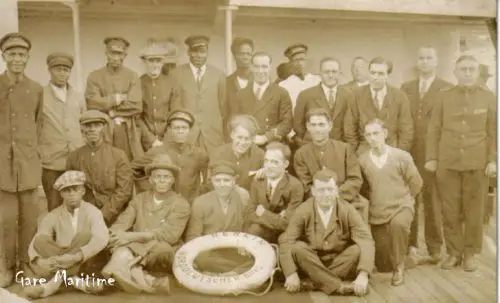
Vestris Survivors aboard the Berlin
Crewman Fred Hansen, a pantry man aboard the Vestris, gave voice to the crew of Boat #1. In an interview conducted with Mark Hellinger in New York City, he defended himself and the others, claiming that they did not row to the assistance of the passengers of #8 when they were struggling in the water, for fear of being swamped. Hansen took the famous series of photos of the Vestris’ final hours, and was quoted as saying:
The worst thing happened when I was in the lifeboat pulling away from the Vestris. The boat turned over and there were all kinds of people being drowned and everything. I raised my camera to get a picture and I remembered that I had no more film. I could have kicked myself all over – that was a terrible thing!
Paul Dana, of R.C.A. and Stewardess Clara Ball drifted together from 1pm Monday until after sunrise on Tuesday morning. They were among the final Vestris survivors located and were widely referred to in the press as “the pluckiest pair” after the story of their nearly 24 hour struggle to survive became known. Miss King returned to her hometown of Pleasantville, New York, where ten years after the disaster she dedicated a plaque to the crew of the American Skipper and a ship model to commemorate those lost aboard the Vestris, at her church. Mr. Dana resumed his trip to Buenos Aires within a week of the disaster, but before he left he gave an extensive interview to Eleanor Roosevelt’s long-time friend Lorena Hickok, who did an excellent job of tightening the narrative before publishing it as an “as told to” account. It is interesting to note that Dana remained silent on one point upon which all of the other survivors of #8 commented – boat #1 – in an otherwise comprehensive account. It is not likely that progressive journalist Hickok would have omitted that detail to protect Lamport and Holt, and even less likely that she would have omitted it for reasons of space: why Dana chose to eliminate any mention of the affair from his narrative is unknown.
Paul Dana and Clara Ball We were in the worst storm I ever saw on the sea.
It was late (Saturday) night, perhaps a little after midnight- that a thing happened that I believe started the trouble that ended in the sinking of the Vestris.
Two big waves hit her, almost simultaneously, bow and stern. The ship quivered from end to end. You could almost feel her wrenching, and I believe that started the leak.
The moment I stepped out of my cabin that morning (Sunday) I started to feel uneasy. The Vestris was listing. In the dining saloon I ran into Captain Fredrik Sorensen, and we started to talk things over. He did not like that list, either. By the middle of the afternoon- while the storm continued with no apparent let-up- the list had become sop pronounced that all of the furniture that wasn’t fastened down in the dining saloon and in the smoking room had slid over to the starboard side, where it was crashing around as the ship rolled.
My cabin was on the top deck, starboard side. When I awoke at 8 o’clock Monday morning, there was the water right on a level with my windows. My steward came in, groaning, with a badly wrenched shoulder. Three was apparently ,leak, he said, the hold was filling with water and he had been bailing with a bucket all night. The cargo had shifted, too, and the ship had tipped clear over until the water was on a level with my windows.
I dressed as quickly as I could, ate the banana that was all my steward could get for my breakfast, and went up to the bow port deck. The crew was throwing the cargo overboard- all the stuff they could handle. It looked like bales of cloth and such stuff. Their derricks weren’t working, so they couldn’t get rid of the heavier things like automobiles. A little crowd of men stood up there, leaning over the railing and watching the crew throw the stuff overboard. Some of them had come out with their life preservers on- they looked pretty scared.
“Well, anyway, we’ve got a nice day to be wrecked on” one of the men said, with a grin.
Officers were about, cheery but non-committal. They never told us anything. I never knew until after the Vestris had gone down that they had even sent out an S.O.S., although when I went into the smoking room for a little while that morning and tried to read and divert my mind, I thought I heard the radio sort of sputtering.
When I went back to my cabin to try to rescue my money that I had left in a trunk, no use- the trunk was under water and wedged in under my bunk. I got my passport, stuck a pack of cigarettes in my pocket and left- for good.
The ship kept on tipping. It looked to me as if she had a list of 45 degrees. You could hardly walk on the deck. At 10:30 the women and children were brought up and told to put on life preservers. But we got no definite information from the officers or the crew. The women were wonderful. Some of them were crying, quietly, but there was no hysteria. One of them had in her arms a baby not more than 8 months old. All the children had been bundled up: they knew, now, that they would probably have to leave the ship.
“Isn’t this fun?” I said to one little fellow, trying to cheer him up. He looked at his mother, who was crying, and nodded solemnly.
At 11;00 they started to launch the lifeboats over the port side- the side that was up as she listed. That was where the trouble began. It took them two hours to launch these boats- an operation that usually takes about ten minutes. The difficulty was that the lifeboats kept catching on the side of the ship. The outside of the lifeboats were covered with clapboard, like a frame house, and these would catch on the overlapping steel plates of the ship’s hull. They tried to hold the lifeboats out- away from the ship’s side- with oars. It was a slow and painful process.
Lifeboat #8- the lifeboat to which I was assigned- had a hole in its side. They patched it up with a piece of tin, before they let us in, but the tin didn’t hold. When the boats were about 20 feet from the water, they told us to climb down a rope ladder and get in. In # 8 before I got in, were 18 women and two children0- two youngsters about 8 or 9 years old. One of these was Clara ball with whom I subsequently floated on the piece or wreckage. Another was Mrs. Inouye, wife of the counselor of the Japanese Embassy in Buenos Aires. The ship’s bartender was aboard.
Damage visible in the lifeboat’s side
Three minutes after we pulled away, the Vestris heeled over on her side and sank. I think one of the most terrible things I saw was 40 men- apparently all those left on board- rushing madly down her side and jumping off from her keel.
One boat never got away at all. It was still on deck when she sank. They tried to launch some from the starboard side, but they had to get them away before they could be filled. These were rowed around tow here her keel had been, and they picked up a lot of the swimmers.
She went down silently- with just a little puff of steam. The boilers must have been cold. The engine room had not been functioning all morning.
Just a few minutes after we pulled away, our lifeboat began to fill with water. The tin patch tore away. She had air compartments, however, so we could stay in her even when she was under water. Still, the women tried to keep calm, although tears were streaming down their cheeks. There was no screaming. One of the children started to whimper. His mother- hastily drying her eyes- tried to comfort him.
It wasn’t long before a big wave came along and capsized us. I got caught under the lifeboat when she turned over. I wasn’t hurt except for a little scrape on my neck. As I struggled out from under, I saw a woman’s foot bob up. I grabbed it. It was Miss Ball.
One of the women drowned when the boat tipped over. Most of the occupants came up, however, including the children. We all got to one side, pulled, and managed to right it again. The women and children climbed in. But the waves were pounding it to pieces. The air compartments, stored under the seats, tore loose. We were breaking up. Great black waves- they looked to be 100 feet high from where we were- kept pounding down on us. The children disappeared, and the women- all except for Miss Ball.I saw a piece of wood wreckage floating in the water nearby. “Come on” I said. We swam to it. “Take hold of one end” I told her “and I’ll take hold of the other.” Silently she did so- never a whisper out of her. We then proceeded to make ourselves as comfortable as we could, to wait for help.
At day break came the worst time for all of us. As the dawn broke- not a ship was in sight. And our piece of wreckage was beginning to break up. We had to hold it together while using it for support.
At about 11 o’clock we sighted the Wyoming. She must have been miles away. But our spar was almost gone. “How about it?” I asked Miss Ball. “Shall we swim for it?” Without a word she started off for the Wyoming. I kept by her side.
We had been swimming for about an hour when I looked back and saw the American Shipper. She was only about a mile away and steaming towards us. I tore off the tail of my shirt and waved it wildly in the air. They saw it. A boat was lowered and we were rescued.
Known to have been rescued from Boat #8 were Mrs. Batten; Mrs. Inouye; Mrs Rua; Mrs. Doril; Mr. Ruckert; Captain Sorensen; Mr. Dana, Miss Ball; Mr. Burton, Mrs Ulrich and Mr. Morris, along with Mrs Devore; Speedway Lady and one other woman, not named, that some newspaper account allege also transferred into Boat #1 before it pulled away. As many as 53 people, the majority of whose identities went unrecorded, saw their hopes of survival vanish on the afternoon of Monday November 12th, 1928, as Boat #1 rowed away from them and their own craft began to break up in the storm.
The rescue, by the Berlin, of the final Vestris survivor, Carl Schmidt, who had been in the water for more than a day

